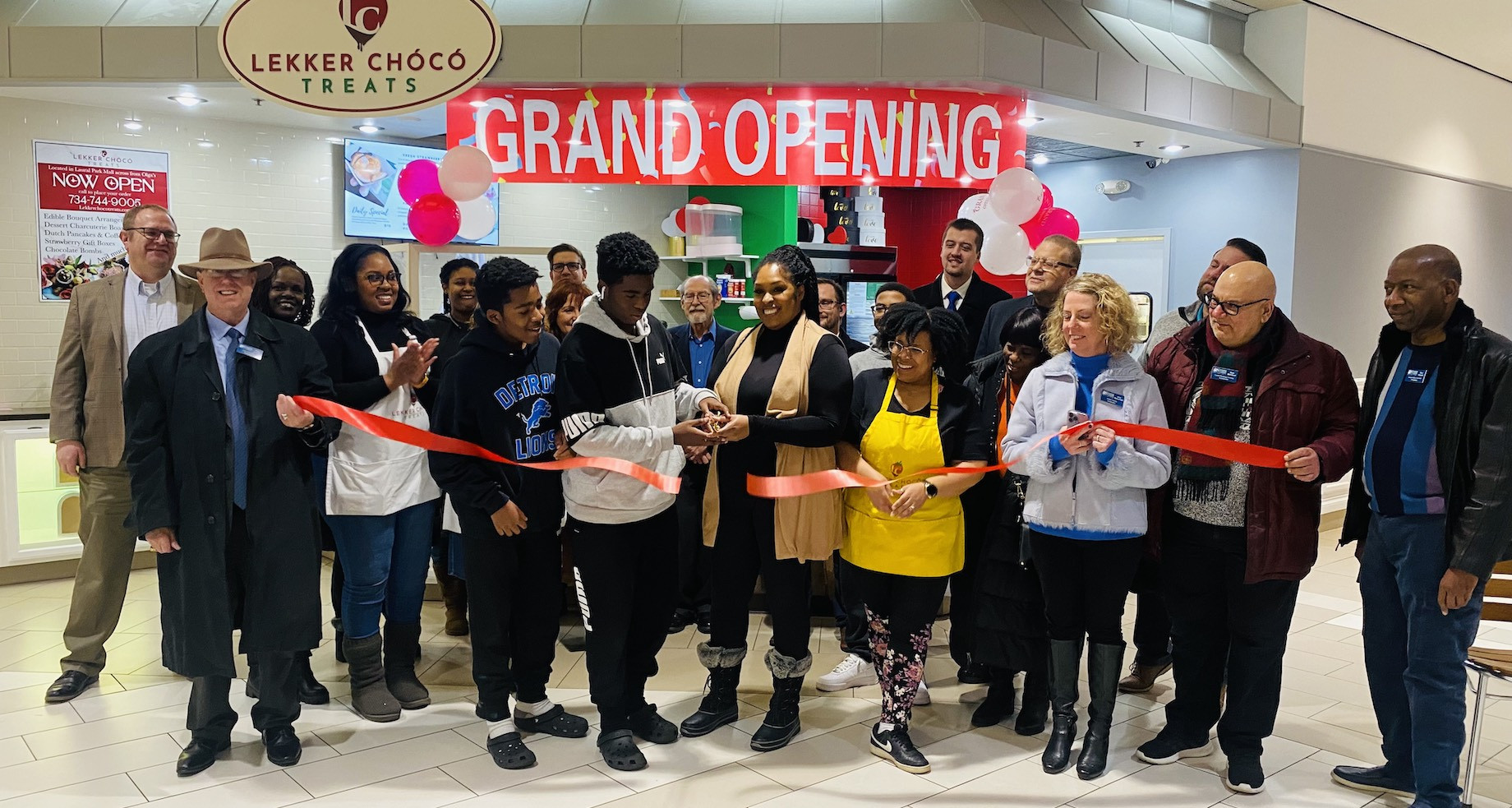Nakija Mills didn’t always plan on being a small business owner. Before opening Lekker Choco Treats — chocolate-covered strawberries, Dutch pancakes and edible bouquets — in December 2022 at CBL’s Laurel Park Place in the Detroit suburb of Livonia, Michigan, she worked as an esthetician.
The career paths may seem divergent, but they follow a thread that has been there throughout: Mills’ entrepreneurial spirit. In high school in the Netherlands, while her peers planned a Valentine’s Day school dance, Mills was the one asking for permission to sell roses at the event. She made a killing. “I tripled my investment,” she recalled. To supplement her income as an esthetician and makeup artist in the 2010s, Mills, always a gifted baker, sold chocolate-covered strawberry trays for parties.
The gig was a fun, profitable side endeavor — until the pandemic. In March 2020, she was sent home from her job at Macy’s. “I remember looking out the window and this emotion of just fear came over me,” she said. “I thought: ‘I have two kids. What am I going to do if my job quits paying me? What’s the next step? How am I going to make money? How am I going to set myself up for long-term?’”
Mills wanted to be in control of her future, and so, during the first weeks of pandemic quarantine, she worked on a business plan to turn her side hustle into a full-time business. She talked with ICSC Small Business Center contributing editor Rebecca Meiser about why she started by selling at festivals and farmers markets, the decision to open up her first brick-and-mortar store and adjustments and lessons learned along the way. Keep reading below.

Founder Nakija Mills, center, celebrates the opening of Lekker Choco Treats’ brick-and-mortar store in Laurel Park Place mall in Livonia, Michigan. Mills started at festivals and farmers markets, moved on to a pop-up in an urban streetfront setting and then opened a permanent spot in the mall.
Why did you launch Lekker Choco Treats at vendor shows like festivals and farmers markets? Had you attended a lot of them?
I had never been to a vendor show before. It forced me to get out there. I had such a fear of really putting myself out there, but when you do a vendor show, you have to pay a fee. A lot of times it’s a nonrefundable fee. I figured if I paid a fee, I am going to have to make it work. Also, with vendor shows, you had the potential of targeting a lot of people in a small amount of time. That’s also why I wanted to really get out there: I felt like if I did it, it would give me an idea of whether people like the product.
This was in the summer of 2020, the midst of COVID. Were a lot of festivals happening? Did a lot of people come out? What was the response?
At first, people were scared to come out for the shows, but they started trickling back in and I found people really loved my product. I sold strawberries on a skewer drizzled with chocolate, and then they could customize it by adding all the toppings they want and everything was included in one price. People loved it because it was fresh and it was a high-end dessert and because they got to customize what they wanted. They asked me: “Where are you located?” That was the main question I got. It made me feel like they wanted to see me again, and it started putting in my head the idea of having my own store so people could always find me. My goal for the next two summers was really to get my name out there in people’s minds.
Was there a point when you knew this was going to work, that you were going to be successful?
Soaring Eagle Arts, Beats & Eats [in Royal Oak, Michigan] in 2021. I remember stepping out of my tent and looking at how long the line was and just being like: “Wow, you know they believe so much in me and my product.” By the last day, we were so busy the cops had to come and tell us to close it down. The festival was closing. I think we did over 1,200 sales in those four days.
In the summer of 2022, you showcased at 43 festivals and markets. Were you able to make a living that way?
No. Everything that I made from my company, I reinvested into my company. It was hard to get any sort of loans or financing from a bank. I used to have money in the stock market and crypto. I took it out, and I invested that into the company. I used my downtime to do things like get my food license and my food management certification and take some online business classes.
How did you pay the bills during that time?
To make my house bills, I would Instacart or I’d do makeup. I did a lot of bridal makeup. After the pandemic, I never went back to my job because I needed flexibility.
How did your physical storefront come about?
From December of 2021 to February of 2022, I had the opportunity to lease a pop-up space in downtown Farmington at Browndog, a former dessert store that closed during the pandemic. It was a good opportunity to see how it would feel to have a brick-and-mortar. It was definitely a learning experience. It taught me patience and consistency. In the beginning, things were really slow. I had only done vendor shows before and was used to large crowds, so when I got into Browndog, I realized that, unlike festivals, people don’t just walk in and they’re not just going to come to you. You need to let them know you’re here and market. I felt like I was building my business from the ground up again. About a week before I closed, I had an interview with [popular local TV show] Live in the D and I felt I sad because I was like: “Everybody’s gonna see me on TV and I’m literally closing in a week.”
The location you’re in now is a former Mrs. Fields cookie shop in Laurel Park Place. Did you always want to be in a mall?
I wasn’t always sure I wanted to be in the mall. But when I briefly had that pop-up store, I learned: With me being a new business, I need to be in a location where there’s people constantly walking by. Even if they’re not purchasing an item, just the fact that they’re seeing you and they’re walking past you — it makes a big difference.
How does brick-and-mortar life differ from a life of vendor shows and festivals?
I’m here every day. I come in at 10:30, sometimes earlier, and I’m here till 8:30 every single day. Before, I would do the markets on the weekends and Instacart during the week.
How do you determine how much hand-dipped fruit to make each day?
That’s a lesson I learned from the pop-up. I was used to a large flow of people at festivals. In a festival, in one day, you might do over 200 sales. And it’s not that way with brick-and-mortar. If you’re lucky, you might do 25 or 30 sales a day. [At the pop-up], I ended up having to throw out a few cartons of strawberries because they didn’t keep, and that was really painful because every dime comes from my own account. But it taught me not to spend as much upfront and if I need more fruit, I can go out and buy it later. So now, we really try to prepare and get a handle on what the traffic might be. I talk with the other store managers, who’ve been there for a while, to get their feedback. And if there’s an event, the mall managers let me know ahead of time: “Hey, you might be busy this weekend. There’s going to be an event.” Those sorts of communication with other vendors help me to gauge what I should make or how much I should make.
How else is having a store different?
With festivals, I stress for three days. I’m up all night preparing and I don’t sleep and then afterwards, I crash. With the store, it’s more of a calm, thinking process. I can plan more consistently, thinking about things like: What are we going to do different next month? Which items are we going to keep? Which items are not selling? With the festival, you just need a few items — tables, chairs, etc. — but with a store, you’re thinking about the light bill, the water bill. You’re thinking about product selection and making sure you have enough of something in stock. You’re thinking literally about so many other items. It’s a longer thinking process but also a lot less stressful because you have more control and can plan.
How is the store doing? Are you profitable? I know it’s still early.
The store is going really good. Every month looks better than the first, so that makes me extremely happy. My goal is to have another store at the end of the year.
Now that you have a full-time store, have you given up on festivals?
No, they’re still important for getting our name out there. We are planning on doing a lot of festivals and markets this summer. But first I need to hire people at the store. I have friends that work with me and I have my sister that works with me, but I do want to hire another full-time person.
Do you have tips for at-home entrepreneurs looking to open small businesses or to take the next step?
Procrastination is the worst. Once you get over your fear of stepping out, you really can do any and everything. Also, stay focused on your vision. Stay focused on your goal. Write down what you want. And remember: Sometimes you have to take two steps back to see the full picture, but have trust in the process.
